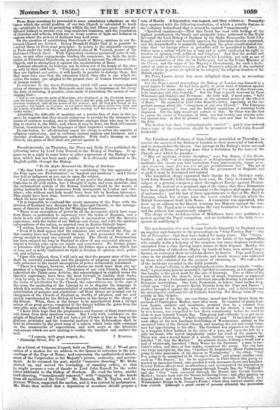At a Court of Common Council, held on Thursday, Mr.
J. Wood gave notice of a motion for an address to the Queen in reference to the proceedings of the Pope of Rome, and expressing the undiminished attachment of the Corporation to her Majesty's person, authority, and government As he restuned his seat, amidst immense cheering," Mr. Blake started up, and moved the rescinding of standing orders' so that he might propose a vote of thanks to Lord John Russell for the noble letter addressed to the Bishop of Durham. He read the letter, amidst lend cheering, "tumultuously renewed," with "clapping of the hands from all members of the Court." Mr. Bonnock, Mr. R. Taylor, and Alderman Wilson, supported the motion, and it was carried by acclamation. Mr. Blake then moved that a deputation of members should prepare a
vote of thanks. A deputation was named, and they withdrew. Presently they appeared with the following resolution, of which a potable feature is the certainty beforehand that it would be carried "unanimously "—
" Resolved. unanimously—That this Court has read with feelings of the highest gratification the timely and admirable letter addressed to the Right Reverend the Lord Bishop of Durham by the Right Honourable Lord John Russell; and entirely and heartily approves the principles therein expressed, and his determination to maintain unimpaired the great constitutional doctrine that 'no foreign prince or potentate will be permitted to fasten his fetters upon a nation which has so long and so nobly vindicated its right to freedom of opinion, civil, political, and religious.' And that the cordial and sincere thanks of this Court be presented to his Lordship, not only as one of the representatives of this city in Parliament, but as the Prune Minister of the Crown, and the organ of her Majesty's Government, for such a declaration of opinion as must reassure all her Majesty's subjects of the unabsted helm of those in power to uphold in its integrity the religious freedom of theBritish empire."
Sir Peter Laurie never was more delighted than now, in seconding such a motion— For the Pope's recent proceedings the Bishop of London waa himself in a great degree to blame : he had been guilty of great want of firmness against Puseyism a few years since, and now is guilty of "a sort of Jim-Crow-ism, both improper and objectionable." But the Pope is much deceived by these . Wiseman& and Oakleys and Newman& : the laity wad, if need arise, fight even upon their stumps in opposition to the assumed pewee of the Church of Rome. He rejoiced at Lord John Russell's letter, especially at the important passage about the "clergymen of our own Church." The Liturgies. had been "muttered" over, and the faithful monitions of doctrinal truth disguised. But the laity would not submit to this. Sir Peter was the first to expose the errors of Puseyism in 1844, and had twenty-one articles written against him : in that he gloried; and they now saw that he had done his duty.
The motion was then "enthusiastically carried " ; and it was ordered that a copy of the resolution should be presented to Lord John Russell forthwith.
























 Previous page
Previous page